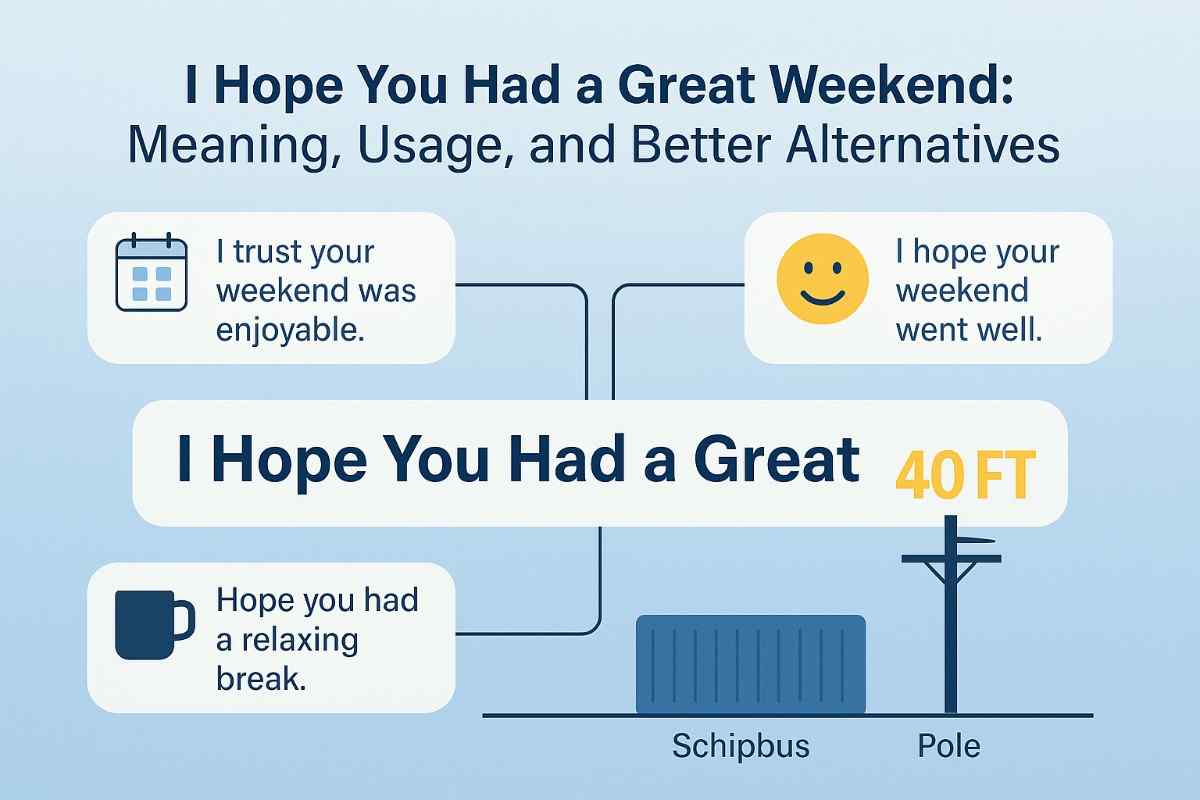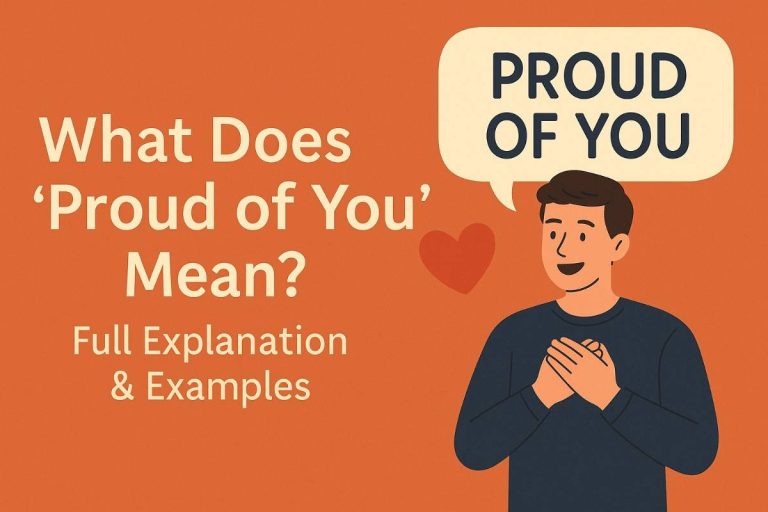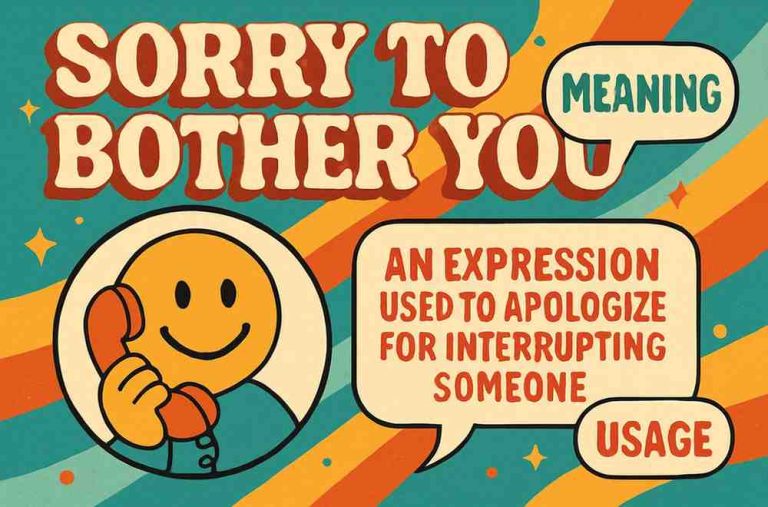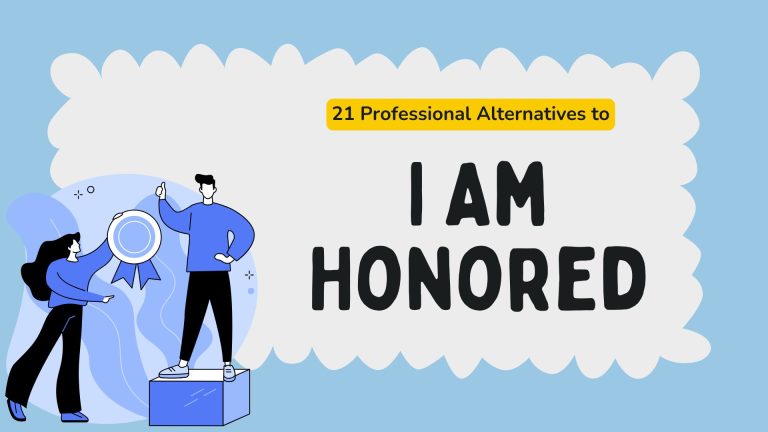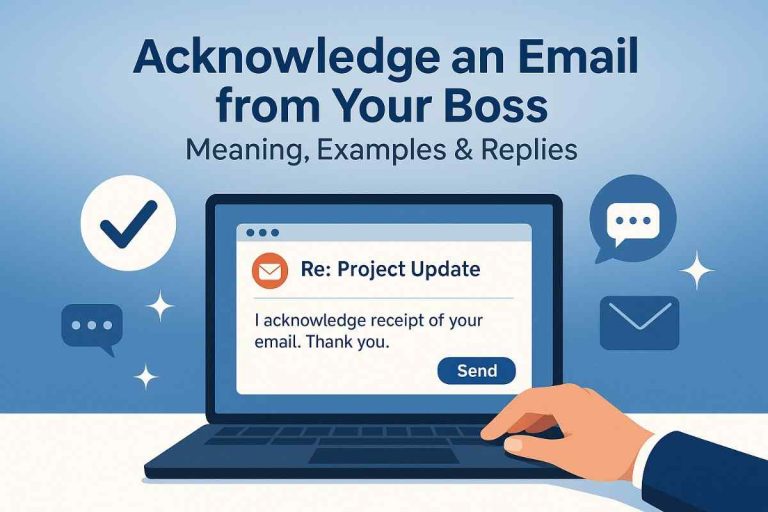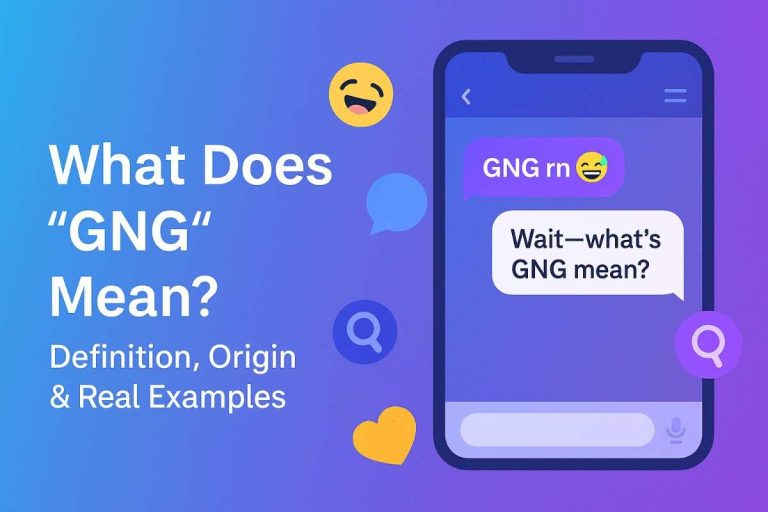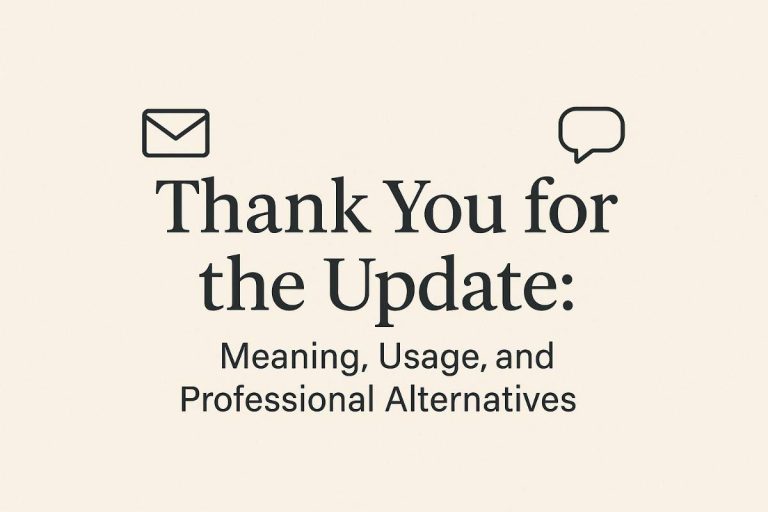I Hope You Had a Great Weekend: Meaning, Usage, and Better Alternatives
Starting an email with a friendly opener can set the tone for the whole conversation. One of the most common ways people begin their emails—especially on Mondays—is with: “I hope you had a great weekend.” It’s polite. It’s familiar. But is it always the best choice?
If you’ve been using this line on repeat, you’re not alone. Still, there are moments when it might feel a bit too casual or overused. That’s why it helps to understand the phrase, know when to use it, and have a few solid alternatives up your sleeve. Let’s keep things simple, clear, and effective.
What Does “I Hope You Had a Great Weekend” Actually Mean?
This phrase is a warm, polite way to begin a conversation, especially on Mondays. It shows that you’re thinking about the other person’s time outside of work. It’s friendly, but not too personal.
It also serves as a gentle buffer before jumping into the real purpose of your message. Think of it as a digital smile.
Here’s what you’re really saying:
- You acknowledge the other person’s time away from work.
- You care enough to mention it.
- You’re easing into a possibly business-heavy message.
Still, it doesn’t always fit every situation. Especially in more formal or fast-paced settings.
When and Where to Use “I Hope You Had a Great Weekend”
Use this line mainly at the start of the week. Monday mornings are when people return to their desks, often with inboxes full of unread emails. A warm start softens the rush.
Best Use Cases:
- Emails to coworkers you know well
- Messages to clients with whom you have a friendly relationship
- Follow-up emails where a light tone works well
Times to Avoid:
- Urgent situations where you need to get straight to the point
- Emails to senior executives or people you don’t know well
- Formal communication where brevity matters
In short, know your audience. What feels warm to one reader may feel too casual to another.
Read Also – Better Ways to Say “Thank You for the Information” (With Examples)
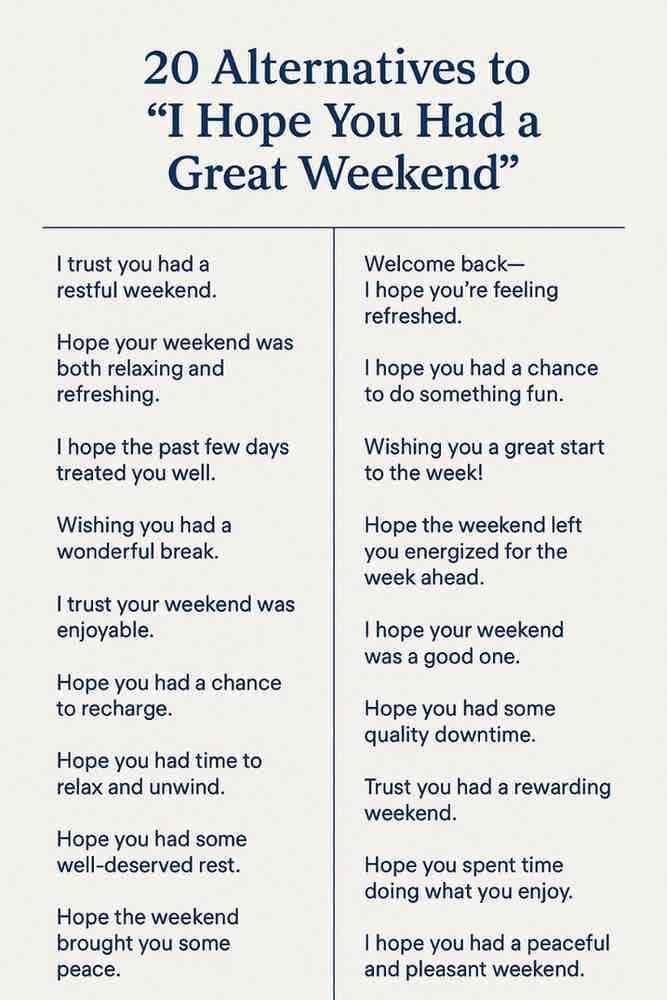
20 Alternatives to “I Hope You Had a Great Weekend”
Need something that fits better with your tone or audience? Here are 20 alternatives, each with clear explanations.
1. I hope your weekend was restful.
Meaning: You’re hoping they had a relaxing time.
Explanation: This version leans a bit more professional.
Example: I hope your weekend was restful and you’re recharged for the week.
Best Use: For emails to coworkers or team members.
2. I trust you had a pleasant weekend.
Meaning: You’re expressing a kind assumption.
Explanation: It sounds more formal than “I hope.”
Example: I trust you had a pleasant weekend and are ready to tackle the new week.
Best Use: For client or customer messages.
3. I hope you enjoyed some downtime.
Meaning: You’re hoping they had time to relax.
Explanation: A little more casual, yet thoughtful.
Example: I hope you enjoyed some downtime over the weekend.
Best Use: Friendly emails to coworkers or partners.
4. I hope your weekend treated you well.
Meaning: You’re wishing them good experiences.
Explanation: Adds a casual, friendly twist.
Example: I hope your weekend treated you well and you got a chance to relax.
Best Use: For light business emails.
5. I hope you had a chance to relax.
Meaning: You care about their well-being.
Explanation: Focuses on mental rest.
Example: I hope you had a chance to relax before the busy week ahead.
Best Use: Supportive or empathetic messages.
6. I trust you had a refreshing weekend.
Meaning: You hope they feel recharged.
Explanation: Sounds both polite and professional.
Example: I trust you had a refreshing weekend and are feeling ready for the week.
Best Use: Business emails with a respectful tone.
7. I hope your weekend went smoothly.
Meaning: You’re wishing no stress or issues.
Explanation: Subtle and versatile.
Example: I hope your weekend went smoothly and all is well on your end.
Best Use: For newer contacts.
8. I hope all is well and you had a good weekend.
Meaning: Combines wellness and casual greeting.
Explanation: Covers both bases without being too long.
Example: I hope all is well and you had a good weekend. Just reaching out about…
Best Use: General professional messages.
9. I hope you had a chance to recharge.
Meaning: You’re acknowledging work stress.
Explanation: This shows empathy.
Example: I hope you had a chance to recharge over the weekend.
Best Use: Emails to teammates or direct reports.
10. I hope you had time to enjoy the weekend.
Meaning: A simple wish for free time.
Explanation: Friendly and neutral.
Example: I hope you had time to enjoy the weekend. Here’s the update you asked for.
Best Use: For follow-up emails.
11. I hope your weekend was everything you needed.
Meaning: Shows deeper care or understanding.
Explanation: Thoughtful and warm.
Example: I hope your weekend was everything you needed before a new week starts.
Best Use: Emails with a more personal tone.
12. I hope you had a peaceful weekend.
Meaning: Wishing calm and rest.
Explanation: Soft and calming.
Example: I hope you had a peaceful weekend. Here are the details you requested.
Best Use: Support-related messages or wellness-centered industries.
13. I hope you had a productive weekend.
Meaning: A nod to those who use weekends to get things done.
Explanation: Encourages a goal-driven tone.
Example: I hope you had a productive weekend and made some great progress.
Best Use: Emails with a motivated tone.
Also see – 24 Ways to Say “Have a Nice Day Ahead” (With Professional Alternatives & Examples)
14. I hope you had some quality time with family.
Meaning: A personal touch.
Explanation: Only use when it makes sense.
Example: I hope you had some quality time with family this weekend.
Best Use: Emails to long-term clients or coworkers.
15. I trust your weekend went well.
Meaning: A polite check-in.
Explanation: Keeps things short and polite.
Example: I trust your weekend went well. I wanted to follow up on our discussion.
Best Use: Business introductions.
16. I hope your weekend was enjoyable.
Meaning: Basic and positive.
Explanation: A safe, all-purpose phrase.
Example: I hope your weekend was enjoyable. Let’s get started on this week’s tasks.
Best Use: General professional messages.
17. I hope you had a lovely weekend.
Meaning: A bit more personal and warm.
Explanation: Works best if you already know the recipient.
Example: I hope you had a lovely weekend! Here’s the file you asked for.
Best Use: Friendly coworkers, regular clients.
18. I hope the weekend was good to you.
Meaning: A playful twist.
Explanation: Still professional, but with personality.
Example: I hope the weekend was good to you. Let me know if you need anything today.
Best Use: Emails with a personal rapport.
19. I hope you had a chance to unplug.
Meaning: Encourages disconnecting from work.
Explanation: Shows care about work-life balance.
Example: I hope you had a chance to unplug this weekend.
Best Use: Internal company communication.
20. I hope your weekend was just what you needed.
Meaning: Kind and open-ended.
Explanation: It lets them define what “good” means.
Example: I hope your weekend was just what you needed. Let’s touch base on next steps.
Best Use: Supportive or managerial tone.
Simple and Polite Responses to “I Hope You Had a Great Weekend”
Not sure how to respond when someone sends this phrase your way? Here are some easy, friendly replies:
- Thanks! I did—hope yours was great too.
- Appreciate that! I had a good one. Hope you did as well.
- It was nice, thanks for asking. How about yours?
- Thanks, it was relaxing. Hope your weekend went well too.
- Sure did! Hope yours was enjoyable as well.
Keep it polite, brief, and light.
Conclusion
“I hope you had a great weekend” is a nice phrase. But it’s easy to overuse. With a few small changes, you can match your tone to your audience and sound more thoughtful. You don’t need to get fancy. Just be clear, kind, and aware of who you’re writing to. And if you ever get tired of saying the same thing, well—now you’ve got 20 better ways to say it.
Use the right tone, and your emails will stand out for all the right reasons.

